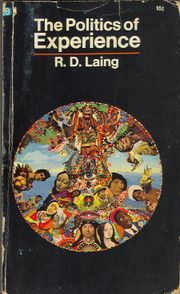NONPROFIT DOUBLESPEAK: EXCESSIVE COMPENSATION
WAR IS PEACE
FREEDOM IS SLAVERY
IGNORANCE IS STRENGTH
$200,000 IS EXCESSIVE COMPENSATION
How did I wander into this strange land where nonprofit executive salaries over $200,000 may be considered excessive?
When you are a lone voice standing against the crowd you are likely to be labeled a) schizophrenic (R.D. Laing[1]); b) a terrorist (G.W. Bush); c) mental-patient (Ken Kasey); d) paranoid (Sydney Pollak); e) neurotic (Freud); f) a poltergeist (Spielberg).
likely to be labeled a) schizophrenic (R.D. Laing[1]); b) a terrorist (G.W. Bush); c) mental-patient (Ken Kasey); d) paranoid (Sydney Pollak); e) neurotic (Freud); f) a poltergeist (Spielberg).
In the movies (at least the movies of the 60’s and 70’s) when you stand by your guns against all odds you are a hero (especially if you triumph in the end). I’m thinking of Dr. Strangelove: How I Learned to Stop Worrying and Love the Bomb; RollerBall; One Flew Over the Cuckoos Nest, etc.
Even fairly recent movies, such as The Matrix, speak to the issue of a hidden reality which we are either afraid (or not permitted) to see. Sadly, in that film, the “false” reality is so powerful one has to take a drug (the red pill) to break through to the other side and see “the truth”.
hidden reality which we are either afraid (or not permitted) to see. Sadly, in that film, the “false” reality is so powerful one has to take a drug (the red pill) to break through to the other side and see “the truth”.
That which we are afraid to say, not allowed to say, can not (ultimately) be repressed. Thus say the psychologists and philosophers of this century (Freud and his theory of the unconscious, Jung and his shadow, Orwell and double-speak). Just the act of “naming” can be a relief in itself.
In an ironic footnote, the very interdependence of thought and speech has proven to be a contentious hypothesis rather than an obvious fact.When linguists, Sapir & Wolff explored the issue, that language might effect (or limit) thought and behavior, a disciplinary controversy erupted. Turns out the hard case “can you have an idea if you do not have a word for it?" is difficult to prove. I will side-step this raging linguistic debate by not worrying about proving the “hard case”.
Whether chicken or egg, we can either not express what we can not conceive of, nor conceive of what we can not express.That place where language and understanding and mental health converge is famously explored by George Orwell in 1984[2] through Newspeak (the artificial language imposed by the Party to limit the capacity to express or even think "unorthodox" thoughts).
That is why, when I came across the AFL-CIO’s “Executive Pay Watch” I felt like I had taken the red pill, broken through to the other side, seen through the screen put up by non-profit new speak. In 2004, the median non-profit CEO salary was $291,356[3] but here were the mid-range salaries of the nations top CEO’s:
Alan G. Lafley, of Procter & Gamble earned $24,620,600; Kenneth I. Chenault American Express earned $23,619,693; Charles O. Prince of Citigroup Inc. $22,994,729; William B. Harrison of JPMorgan Chase & Co. earned $22,338,815;Kenneth D. Lewis of Bank of America earned $22,027,984.
Compare these to your salary!
---------------------------------------------
[1] Laing, R.D. (1967) The Politics of Experience and the Bird of Paradise. Harmondsworth: Penguin.
[2] Nineteen Eighty-Four, its terminology and even its author have become bywords in discussions concerning privacy or state-security issues. The term "Orwellian" has come to describe actions or organizations reminiscent of the totalitarian society depicted throughout the novel.
[3] Chronicle of Philanthropy, September 30, 2004 Executive Pay Rises Modestly “Trend could continue as IRS increases scrutiny” by Ben Gose
Technorati Tags: Blue Pill, Doublespeak, Excessive Compensation, Newspeak, Nonprofit, Red Pill
FREEDOM IS SLAVERY
IGNORANCE IS STRENGTH
$200,000 IS EXCESSIVE COMPENSATION
How did I wander into this strange land where nonprofit executive salaries over $200,000 may be considered excessive?
When you are a lone voice standing against the crowd you are
 likely to be labeled a) schizophrenic (R.D. Laing[1]); b) a terrorist (G.W. Bush); c) mental-patient (Ken Kasey); d) paranoid (Sydney Pollak); e) neurotic (Freud); f) a poltergeist (Spielberg).
likely to be labeled a) schizophrenic (R.D. Laing[1]); b) a terrorist (G.W. Bush); c) mental-patient (Ken Kasey); d) paranoid (Sydney Pollak); e) neurotic (Freud); f) a poltergeist (Spielberg).In the movies (at least the movies of the 60’s and 70’s) when you stand by your guns against all odds you are a hero (especially if you triumph in the end). I’m thinking of Dr. Strangelove: How I Learned to Stop Worrying and Love the Bomb; RollerBall; One Flew Over the Cuckoos Nest, etc.
Even fairly recent movies, such as The Matrix, speak to the issue of a
 hidden reality which we are either afraid (or not permitted) to see. Sadly, in that film, the “false” reality is so powerful one has to take a drug (the red pill) to break through to the other side and see “the truth”.
hidden reality which we are either afraid (or not permitted) to see. Sadly, in that film, the “false” reality is so powerful one has to take a drug (the red pill) to break through to the other side and see “the truth”.That which we are afraid to say, not allowed to say, can not (ultimately) be repressed. Thus say the psychologists and philosophers of this century (Freud and his theory of the unconscious, Jung and his shadow, Orwell and double-speak). Just the act of “naming” can be a relief in itself.
In an ironic footnote, the very interdependence of thought and speech has proven to be a contentious hypothesis rather than an obvious fact.When linguists, Sapir & Wolff explored the issue, that language might effect (or limit) thought and behavior, a disciplinary controversy erupted. Turns out the hard case “can you have an idea if you do not have a word for it?" is difficult to prove. I will side-step this raging linguistic debate by not worrying about proving the “hard case”.
Whether chicken or egg, we can either not express what we can not conceive of, nor conceive of what we can not express.That place where language and understanding and mental health converge is famously explored by George Orwell in 1984[2] through Newspeak (the artificial language imposed by the Party to limit the capacity to express or even think "unorthodox" thoughts).
That is why, when I came across the AFL-CIO’s “Executive Pay Watch” I felt like I had taken the red pill, broken through to the other side, seen through the screen put up by non-profit new speak. In 2004, the median non-profit CEO salary was $291,356[3] but here were the mid-range salaries of the nations top CEO’s:
Alan G. Lafley, of Procter & Gamble earned $24,620,600; Kenneth I. Chenault American Express earned $23,619,693; Charles O. Prince of Citigroup Inc. $22,994,729; William B. Harrison of JPMorgan Chase & Co. earned $22,338,815;Kenneth D. Lewis of Bank of America earned $22,027,984.
Compare these to your salary!
---------------------------------------------
[1] Laing, R.D. (1967) The Politics of Experience and the Bird of Paradise. Harmondsworth: Penguin.
[2] Nineteen Eighty-Four, its terminology and even its author have become bywords in discussions concerning privacy or state-security issues. The term "Orwellian" has come to describe actions or organizations reminiscent of the totalitarian society depicted throughout the novel.
[3] Chronicle of Philanthropy, September 30, 2004 Executive Pay Rises Modestly “Trend could continue as IRS increases scrutiny” by Ben Gose
Technorati Tags: Blue Pill, Doublespeak, Excessive Compensation, Newspeak, Nonprofit, Red Pill
Comments
Executive, American Physical Society,
per
...allbusiness.com/manufacturing/.../869925-1.html
Yes this executive, from my personal knowledge, because she would not pay lower level mostly femail staff more than mid-twenties to live in DC area. Some lived in trailer parks, others drove unsafe cars that belonged in the junkyard.
Yes, than that salary is excessive. Even if certain wrongs aren't as bad as other examples, doesn't make them OK.